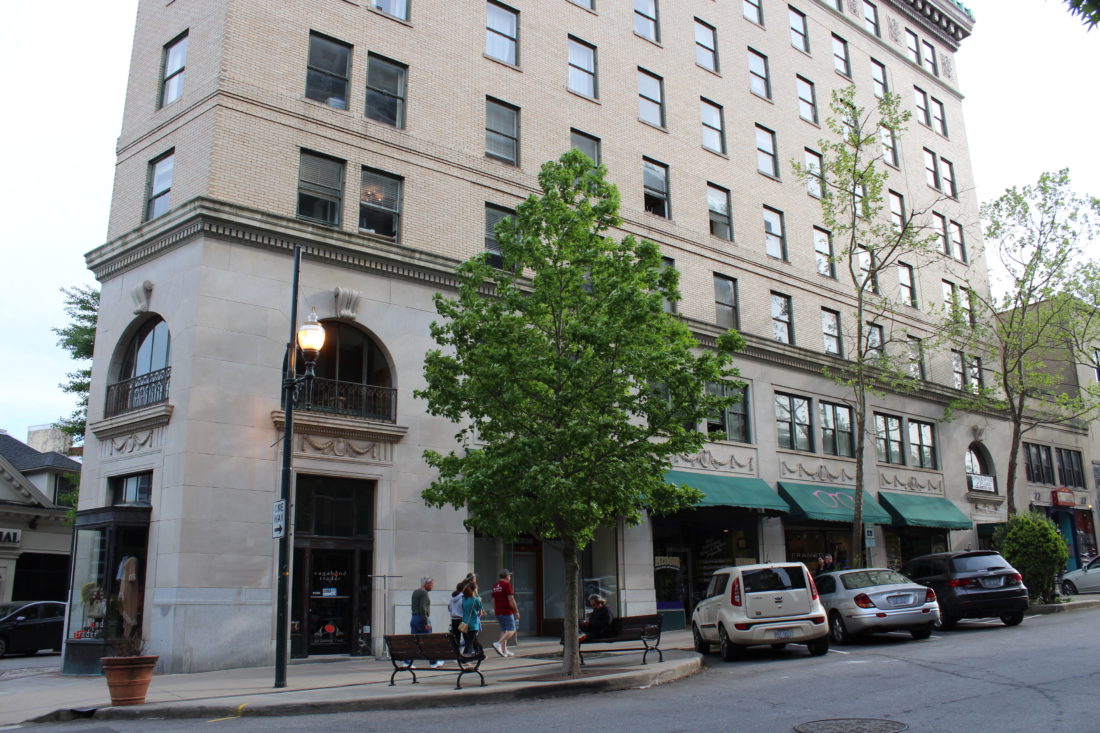While the July 23 meeting of Asheville City Council was relatively short — just under an hour and a half — it set the stage for several major conversations to come. Council members announced separate meetings on affordable housing and a potential temporary hotel moratorium, then moved into closed session to further discuss whether the city should take action on the issue of state-imposed district elections.
On Friday, Sept. 6, said Council member Julie Mayfield, the city will hold an affordable housing work session to explore options such as tiny homes and housing voucher acceptance for long-term rentals. Her declaration came in response to public comment from Drew Crawford, owner of Asheville-based DIY Tiny, who proposed using tiny houses on wheels to address affordable housing shortages.
Crawford asked Council to expand permitted zoning areas for tiny homes to include campgrounds and floodplains, thus increasing their availability and offering alternatives to traditional accessory dwelling units. “They’re not tied to a park that can continually raise prices. This is why ‘on wheels’ is a necessary part of our conversation, because we have large investments [firms] in the region buying up mobile home parks, and they’re not really mobile. The prices get raised, and the lot rent, and the people are stuck there,” Crawford said.
Council members made moves on affordable housing earlier in the night as well, approving three separate Housing Trust Fund loans to support a total of 151 new affordable apartments for individuals and families at under 60% of the area median income ($39,840 per year for a family of four). At least 11 units will be for homeless residents, according to a city press release issued after the approval.
Mayfield also announced that Council plans to discuss whether the city should temporarily ban new hotels in the city during its Planning and Economic Development Committee meeting on Thursday, Aug. 29. She explained that she had floated the idea to Mayor Esther Manheimer after the June 25 vote to allow the conversion of the Flatiron Building into a boutique hotel.
“We could have a moratorium in place, I think, well before the end of the year, in order to give us the breathing room that we need to have the conversation around guardrails and around hotel construction in the city,” Mayfield said. “Some people will love that, some people will hate that, but that’s where we’re headed.”
Mayfield was in the majority for the Flatiron approval vote, along with Manheimer, Vice Mayor Gwen Wisler and Council member Vijay Kapoor. She had previously expressed opposition to the project at a May 14 meeting, saying she viewed the Flatiron as “the spiritual center of our city.”
Just after these announcements, Council member Sheneika Smith made a motion for the body to go into closed session to consult with City Attorney Brad Branham regarding “the potential lawsuit regarding city council election districts.” Neither Council members nor city officials specified when they would discuss the issue publicly.






“Somebody please stop me before I vote for another hotel!” A hotel moratorium at this juncture seems like the planning, zoning and development equivalent of pointing the fire hoses at a house that has already burned to the ground.
Moratoriums imposed by government officials which effectively constrain their own decision making are clumsy & usually unworkable responses to situations which were created by poor decision making to begin with. It’s as if the Council needed to prohibit itself from making decisions it otherwise would. In the meantime, projects worth considering would get shut out, while poor decisions already made would continue to be implemented.
Mayfield, Manheimer, Wisler & Kapoor cannot put this genie back in the bottle. I have supported three of these four council members in the past. I have never considered myself a one issue voter. But their decision in favor of the Flatiron hotel conversion was objectively a terrible decision for downtown, and it will weigh very, very heavily in the decisions of many voters in future elections (be it for council or state senate). A moratorium now will not change that political reality one bit.
Does City Council make back room deals with developers? Did they make a deal with RiverLink if they dropped their lawsuit against the city they would change zoning and allow a developer to build a restaurant along the banks of the French Broad? How is this allowed to happen?
In reply to Munson, I hope that your question is rhetorical. Everyone who knows that Asheville has a City Council knows that they make backroom deals. You don’t seriously think that a developer comes in to build a new housing project, and suddenly gets a case of the feels and decides to just give the City $300,000 for their affordable housing trust (slush) fund?
Here’s how those decisions really go: A developer sees Asheville as a growing market, so he buys a piece of property. He hires a local design firm or attorney (or both), and they tell new developer, “the City’s gonna balk at approving a hundred million dollar houses, but if you throw some money at them for their pet political promise (affordable housing), they’ll approve your project”. In most places it’s considered extortion, but Asheville voters seem OK with it. I’m hoping that since the Feds are next door looking at some crony politics, that they’ll take an interest in Asheville. Lord knows that Cathy Ball has more cronies and questionable relative hires than Wanda Greene. Mountain X just won’t look into it. She just hired her niece as an Assistant Director pulling another $100k job into the family.
Also, Mr. Crawford mentions mobile homes, which were the previous generations affordable housing. It’s curious that Asheville City Council effectively banned that as an affordable housing option and now rallies and extorts in the name of affordable housing. Is that not the definition of a manufactured crisis?